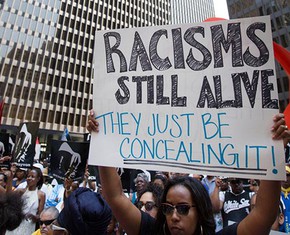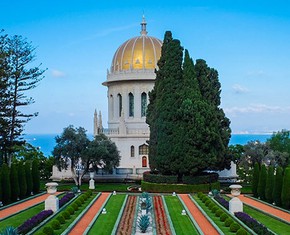The views expressed in our content reflect individual perspectives and do not represent the authoritative views of the Baha'i Faith.
What if the entire scope of human history up to this point only represents our collective childhood and adolescence?
That’s one way to look at the Baha’i understanding of our shared genealogy as a race, and at a Baha’i theory of history. The Baha’i teachings say that humanity goes through periods and phases in its aggregate life, just as each individual human being grows and matures by passing through a series of physical, mental and spiritual stages:
From the beginning to the end of his life man passes through certain periods, or stages, each of which is marked by certain conditions peculiar to itself. For instance, during the period of childhood his conditions and requirements are characteristic of that degree of intelligence and capacity. After a time he enters the period of youth, in which his former conditions and needs are superseded by new requirements applicable to the advance in his degree. His faculties of observation are broadened and deepened; his intelligent capacities are trained and awakened; the limitations and environment of childhood no longer restrict his energies and accomplishments. At last he passes out of the period of youth and enters the stage, or station, of maturity, which necessitates another transformation and corresponding advance in his sphere of life activity. New powers and perceptions clothe him, teaching and training commensurate with his progression occupy his mind, special bounties and bestowals descend in proportion to his increased capacities, and his former period of youth and its conditions will no longer satisfy his matured view and vision. – Abdu’l-Baha, The Promulgation of Universal Peace, p. 438.
In the same way, Abdu’l-Baha said, humanity itself passes through comparable stages of maturation—only on a much longer timeframe:
Similarly, there are periods and stages in the life of the aggregate world of humanity, which at one time was passing through its degree of childhood, at another its time of youth but now has entered its long presaged period of maturity, the evidences of which are everywhere visible and apparent. Therefore, the requirements and conditions of former periods have changed and merged into exigencies which distinctly characterize the present age of the world of mankind. That which was applicable to human needs during the early history of the race could neither meet nor satisfy the demands of this day and period of newness and consummation. Humanity has emerged from its former degrees of limitation and preliminary training. Man must now become imbued with new virtues and powers, new moralities, new capacities. New bounties, bestowals and perfections are awaiting and already descending upon him. The gifts and graces of the period of youth, although timely and sufficient during the adolescence of the world of mankind, are now incapable of meeting the requirements of its maturity. The playthings of childhood and infancy no longer satisfy or interest the adult mind. – Ibid., pp. 438-439.
This major conceptual framework—the gradual evolution and maturation of the whole human race—fits together perfectly with the Baha’i principle of progressive revelation. If you think of the prophets and messengers sent by the Creator as the teachers in a universal school, and humanity as the students, you’ll immediately understand the metaphor:
All humankind are as children in a school, and the Dawning-Points of Light, the Sources of divine revelation, are the teachers, wondrous and without peer. In the school of realities they educate these sons and daughters, according to teachings from God, and foster them in the bosom of grace, so that they may develop along every line, show forth the excellent gifts and blessings of the Lord, and combine human perfections; that they may advance in all aspects of human endeavour, whether outward or inward, hidden or visible, material or spiritual, until they make of this mortal world a widespread mirror, to reflect that other world which dieth not. – Abdu’l-Baha, Selections from the Writings of Abdu’l-Baha, p. 128.
Since everything alive grows, develops and matures sequentially, gradually adding layers of complexity and depth, the Baha’i teachings combine these two organic metaphors—progressive spiritual revelation and collective human maturation—into one coherent theory of history:
O thou true friend! Read, in the school of God, the lessons of the spirit, and learn from love’s Teacher the innermost truths. Seek out the secrets of Heaven, and tell of the overflowing grace and favour of God.
Although to acquire the sciences and arts is the greatest glory of mankind, this is so only on condition that man’s river flow into the mighty sea, and draw from God’s ancient source His inspiration. When this cometh to pass, then every teacher is as a shoreless ocean, every pupil a prodigal fountain of knowledge. – Ibid., p. 109.
Baha’is believe that Baha’u’llah, the most recent founder of a global Faith, brought a new revelation to lead humanity to the next stage in its maturity by uniting the peoples, nations and religions:
To accomplish this great and needful unity in reality, Baha’u’llah appeared in the Orient and renewed the foundations of the divine teachings. His revelation of the Word embodies completely the teachings of all the Prophets, expressed in principles and precepts applicable to the needs and conditions of the modern world, amplified and adapted to present-day questions and critical human problems. That is to say, the words of Baha’u’llah are the essences of the words of the Prophets of the past. They are the very spirit of the age and the cause of the unity and illumination of the East and the West. – Abdu’l-Baha, The Promulgation of Universal Peace, p. 313.
















Comments
Sign in or create an account
Continue with Googleor